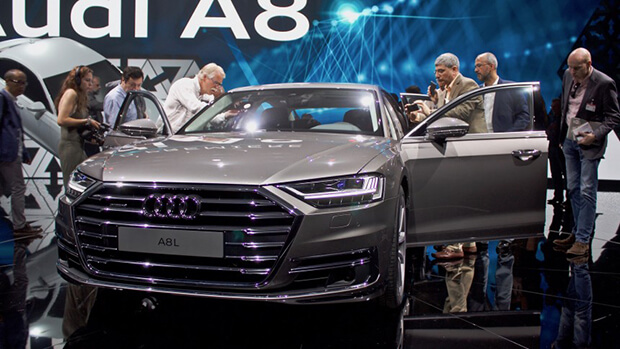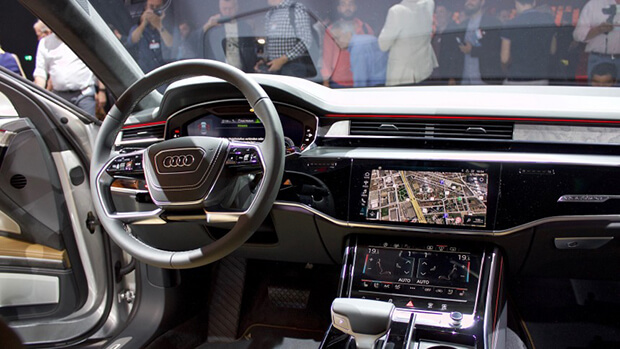Is Ireland ready for driverless cars?

Last week, Audi launched its fourth generation luxury model, the Audi A8 which has what Audi is calling, "level-three" autonomy which means the driver can take their hands off the steering wheel and the car does the rest.
So does this mean that we will see driverless cars on Irish roads sooner than we think? Well, Not quite.
Many may not know but there are five distinct self-driving 'levels' that cars fall into.
Level one is the most basic assistance mechanisms, such as cruise control.
Level two encompasses some basic driverless features, such as emergency braking and 'lane assist', where the car can steer itself back from crossing a motorway lane.
Level three, such as that contained in the new Audi A8 is where things start to get much more automated. At this level, the car can make advanced decisions based on monitoring traffic and conditions around it. In theory, a level-three car can drive for an extended period with no hands on the steering wheel or a foot on any pedal.
level-three vehicles, though, are not considered to be fully capable of dealing with complex traffic scenarios and the driver must revert back to manual control at very short notice when an issue occurs.
There is an inherent danger in this level of autonomy, as it can make the driver complacent. For this very reason, some car manufacturers are skipping this level altogether and going straight to level four.
Where the major change will happen for future autonomy is at this level, where the driver is still present, but will not be expected to intervene, even in a dangerous situation. The vehicle will basically drive itself and as a result, many level-fours vehicles may not even have steering wheels or pedals.
Level five is the absolute driverless car, with the vehicle capable of doing anything on the road without any human interaction whatsoever.
How near are we to level four autonomy. Well, believe it or not, Tesla Motors says it will have level-four vehicles on the road by the end of next year and Ford has revealed that they too will have level-four cars by 2021.
With the almost imminent arrival of truly autonomous cars, there will be huge legal, regulatory and financial issues that must be dealt with by government legislators sooner rather than later.

Irish law, as it stands, does not recognise any form of automation as an acceptable assistant to a driver. If you drive without your hands on the steering wheel, a Garda can caution you for dangerous driving, regardless of the car's automation. A driver in this scenario cannot make the claim that they left the car in control of the computer, no matter how advanced it is.
Insurance companies also have huge hurdles to climb as they do not have policies that cover fully for self-driving cars. With the availability of cars like the A8 now hitting the roads, insurance companies may start to look at adapting their policies.
The positive aspect of the new autonomy is that insurance on driverless cars should be a lot cheaper than manually-operated vehicles as when computers are in charge, there are fewer accidents.
Tesla is proving these positive aspects to be the case as an accident involving their vehicles have fallen by 40pc since the company introduced its 'Autopilot' function, a 'level-two' feature. Fewer crashes mean lower premiums. Tesla certainly sees it this way, seizing an opportunity in some markets to sell its own insurance at the time of the car purchase.
In particular, there will be times when a car's onboard computer will be required to choose between a combination bad results and from a human standpoint make the unthinkable decision.
An example might be when a child on a bicycle races out in front of a car and the only avoidance option is to drive into a tree, which could possibly kill the driver or passengers. What if one of the passengers on board is another child? Which does the car choose as a choice may have to be made to counteract a catastrophic tragedy?
Certain sectors are not warming to the idea of self-driving cars as they stand to lose out on business, such as lawyers in insurance or injury cases, insurance companies.
Autonomous cars, vans, buses and trucks could represent the single biggest technological change that ordinary Irish people see over the next 10 years.
The benefits could be huge as crashes decrease and insurance premiums dramatically fall. Drink-driving laws will no longer concern many revellers as in a fully self-driving vehicle, it won’t matter if you are over the limit. You will have your own personal robotic autonomous chauffeur.
It could also result in what Audi has described as the "25th hour", extra time to focus on work or leisure things because you don't have to drive your vehicle.
But whether we welcome it or dread it, driverless cars are coming. Audi's A8 is just the first step.
(As always, if you or a family member are considering buying a used car, don’t buy until you run a car check report with MyVehicle.ie where you will find out the true history of the vehicle.)

Author

Justin Kavanagh
Justin Kavanagh is a recognised leader
in automotive intelligence and vehicle
data supply to the entire motor industry.
He has almost 20 years experience in
building systems from the ground up.
As the Managing Director of Vehicle
Management System, he understands the
need and importance of trustworthy and
reliable vehicle history and advice to
both the trade and the public.
Follow me on LinkedIn